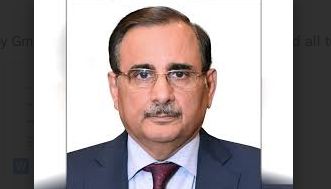Anjum Nisar warns both govts must move beyond rhetoric to remove barriers
ISLAMABAD, OCT 26 /DNA/ – The Businessmen Panel (BMP) of the Federation of Pakistan Chambers of Commerce and Industry (FPCCI) has cautioned that Pakistan and Iran’s latest commitment to enhance border infrastructure and expand bilateral trade will remain largely symbolic unless both governments act decisively to remove deep-rooted trade barriers, complete the long-delayed Iran–Pakistan gas pipeline, and introduce genuine structural reforms to enable real economic integration between the two neighboring states.
In a statement issued on Sunday, BMP Chairman and former FPCCI president Mian Anjum Nisar said the business community has heard similar assurances many times over the years, but the outcomes have remained negligible. He said that despite repeated announcements and numerous memorandums of understanding, the trade potential between Pakistan and Iran continues to be restricted by bureaucratic delays, banking limitations, policy confusion, and lack of political will.
The statement came in the wake of Pakistan’s Commerce Minister Jam Kamal Khan’s visit to Tehran for the 22nd session of the Pakistan–Iran Joint Economic Commission (JEC), where both sides reaffirmed their resolve to strengthen border markets, improve customs coordination, and promote trade and transport linkages. While appreciating the renewed diplomatic engagement, Anjum Nisar noted that mere pledges will not bring meaningful results unless they are accompanied by immediate, on-ground action.
He observed that bilateral trade between the two countries currently stands at around $3 billion—a figure far below its real potential, given their geographical proximity and shared energy and agricultural interests. “Pakistan and Iran have been making the same promises for more than two decades,” Nisar said. “Every meeting, every joint statement speaks of cooperation, yet the numbers remain stagnant. This shows that the problem is not intent—it is implementation.”
Anjum Nisar warned that without addressing the fundamental obstacles that have long obstructed formal trade—such as the absence of banking channels, cumbersome customs procedures, inconsistent regulatory frameworks, and over-reliance on informal barter—no new agreement or infrastructure project will deliver tangible benefits. “Building new roads or terminals is of little use when traders cannot even transfer payments through legal channels,” he said. “We have created an environment where formal trade is discouraged and smuggling becomes the only viable option for many border communities.”
The BMP chief stressed that one of the most glaring examples of unfulfilled potential is the Iran–Pakistan gas pipeline project, which has been delayed for over a decade despite being a mutually beneficial energy lifeline. “Iran has already completed its part of the project, but Pakistan continues to delay construction due to political pressure and lack of courage,” he said. “This pipeline could ease Pakistan’s energy crisis, reduce industrial costs, and strengthen regional connectivity, but indecision and external dependency have paralyzed it. Such failures send the wrong message to investors and regional partners alike.”
He added that unless Pakistan demonstrates the will to complete projects it has already agreed upon, other bilateral initiatives will also be viewed with skepticism. “No one will take our regional commitments seriously if we cannot even implement an agreement that has been pending for years,” he said.
Anjum Nisar said that the border areas between the two countries, such as Taftan, Panjgur, and Mashkhel, once had vibrant trade activity but are now struggling under the weight of overregulation, poor infrastructure, and excessive security restrictions. “Instead of facilitating cross-border business, government policies have suffocated it,” he noted. “Thousands of families in border districts have lost their livelihoods as formal trade has collapsed. This vacuum has only strengthened informal channels and weakened the state’s revenue base.”
He said that the newly proposed expansion of border markets is a positive move in theory but will remain ineffective without institutional reforms. “Real facilitation requires clear rules, digital customs systems, transparent monitoring, and proper logistics support,” he explained. “Traders need an environment where they can operate legally, not one where bureaucracy and red tape force them into grey markets.”
The BMP chairman also criticized the pattern of holding Joint Economic Commission meetings that end with optimistic press releases but no measurable progress afterward. “We have seen countless JEC sessions and memorandums, yet the same challenges resurface every year,” he said. “If the bureaucracy remains unwilling to implement decisions or coordinate with the private sector, these forums will continue to serve as mere ceremonial exercises.”
He urged both Islamabad and Tehran to take immediate confidence-building measures to demonstrate seriousness. These include operationalizing barter trade for select goods, reopening long-closed trade routes, establishing modern one-window border terminals, and enabling small traders to access banking and insurance facilities. “The time for photo sessions is over. The time for implementation has come,” he said.
Anjum Nisar further warned that repeated failures to deliver on economic promises risk damaging Pakistan’s credibility in regional trade diplomacy. “Investors and trading partners will not believe in our commitments unless they see consistent action and follow-through,” he said. “Our policymakers must realize that regional integration is not a slogan—it requires persistence, coordination, and political stability.”
He said that Pakistan cannot afford to keep its western border underdeveloped while it talks about trade diversification and connectivity. “If we are serious about turning Pakistan into a trade corridor, we must treat the Iran border as an economic opportunity, not a security threat,” he said. “A strong and regulated trade with Iran can reduce smuggling, boost revenue, and improve livelihoods in Balochistan.”

















